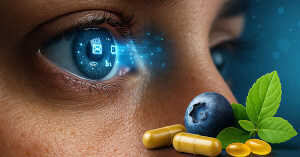
Bilberry
Bilberry is rich in antioxidants and supports eye health, circulation, and heart health.
Bilberry (Vaccinium myrtillus) is a small, dark berry native to Europe, closely related to the American blueberry. It has long been used in herbal medicine, especially for supporting vision and circulation.
Bilberries are rich in anthocyanins, powerful antioxidants that may help strengthen blood vessels and improve capillary integrity. These compounds are also thought to support eye health and protect against oxidative stress.
Bilberry is commonly taken to promote night vision, manage varicose veins, and support overall vascular health. While early studies are encouraging, especially in eye-related uses, further scientific validation is still needed.
Other names & forms of Bilberry supplement : vaccinium myrtillus, european blueberry, bilberry extract, bilberry fruit
Possible Benefits
Thanks to its rich nutritional profile, bilberry has been linked to a variety of potential health benefits:
- Eye Health: Bilberry is renowned for supporting eye health, particularly night vision and visual acuity. Its anthocyanins help protect the retina from oxidative damage.
- Circulation: Taking bilberry may help promote healthy blood flow, benefiting capillary strength throughout the body.
- Antioxidant Support: Rich in antioxidants, bilberry may contribute to anti-aging by protecting cells from free radicals.
- General Health: Regular consumption of bilberry may offer broader health benefits thanks to its dense nutritional profile.
Side Effects
Bilberry can support your vision, but a few users notice minor side effects as the body adjusts. Look out for:
- Gastrointestinal discomfort, mild stomach upset, bloating, or diarrhea
- Headache or dizziness, particularly at higher doses
- Occasional skin rash or itching in those with berry sensitivities
- Possible changes in blood sugar fluctuations, monitor if diabetic
- Mild discolored stool (a harmless effect of the berry pigment)
Interactions
Potential interactions include:
- Diabetes medications: Bilberry’s anthocyanins may enhance glucose-lowering effects of insulin or Cinnamon, increasing hypoglycemia risk.
- Anticoagulants and antiplatelets: Bilberry may inhibit platelet aggregation, compounding effects of warfarin or supplements like Garlic, thus elevating bleeding potential.
- Blood pressure drugs: Potential mild vasodilatory action could add to antihypertensives or herbs like L-Arginine, risking hypotension.
- Antibiotics: Limited data suggest Bilberry might interfere with antibiotic absorption; separate dosing by 2-3 hours.
Precautions
Before you start taking Bilberry, confirm that none of these apply to you. If they do, discuss with your healthcare provider:
- Pregnant or breastfeeding women: Insufficient data on safety; best to avoid until more studies are available
- Individuals on blood thinners: Bilberry can have mild anticoagulant effects; monitor clotting parameters
- People with diabetes: May lower blood sugar; adjust diabetic medications under medical supervision
- Those with berry or anthocyanin allergies: Risk of allergic reaction; avoid if you have known sensitivities
- Patients scheduled for surgery: Potential bleeding risk; discontinue at least two weeks beforehand
Studies
These studies provide scientific insights into Bilberry benefits:
A 2004 systematic review concluded that bilberry extract does not improve night vision in healthy individuals, based on four rigorous RCTs using 12-150 mg/day anthocyanins.
A 2025 RCT in healthy volunteers found that 160 mg daily of bilberry extract for 6 weeks improved night contrast sensitivity by 18% and visual acuity by 12% versus placebo.
A 2017 double-blind RCT showed bilberry extract significantly increased tear secretion in dry-eye patients and boosted antioxidant markers.
A 2022 review highlighted contradictory results for bilberry in type 2 diabetes and circulatory disorders, with some trials reporting glycemic or lipid improvements and others finding no significant effects, indicating the need for larger RCTs.
Disclaimer: This page is for educational purposes and does not replace medical advice. If you're pregnant, have a condition, or take medication, speak with a qualified professional.
Related Articles








